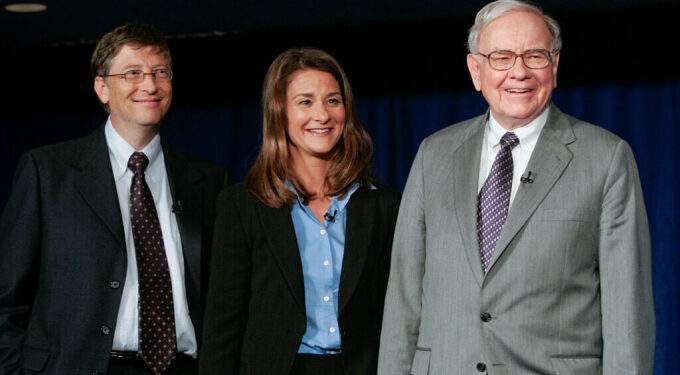At 17, Emily Kaiser, daughter of oil billionaire George Kaiser, left her hometown of Tulsa, Oklahoma, determined to carve out her own path elsewhere. While she built a career overseas over the next decade, her father continued to grow his wealth and became one of the first supporters of the Giving Pledge, a campaign launched in 2010 by Bill Gates, Melinda French Gates and Warren Buffett to inspire the world’s wealthiest to commit their fortunes to tackling urgent issues.
Starting out with 40 American philanthropists, the pledge now includes over 240 signatories reportedly pledging a pool of $600 billion, according to Fortune.
Among them are some of the planet’s richest individuals, such as Elon Musk and Mark Zuckerberg. This year alone, 11 new members have joined, including Canva co-founder Cameron Adams and Dropbox CEO Drew Houston.
George Kaiser’s commitment to donate the majority of his wealth during his lifetime or through his will left Emily uncertain about her role in that vision.
“My initial response was, ‘I have no expertise and nothing to offer,’” Emily said, as quoted by Bloomberg.
Similar to Emily, many heirs to vast fortunes wrestle with uncertainty or doubt about how, or whether, they would carry forward their parents’ philanthropic goals.
To help them navigate the complex issue, a group within the Giving Pledge, called Next Gen, was formed in 2014 as a gathering space for the children and grandchildren of pledgers to share experiences and explore their roles.
For Tanya Masiyiwa, the daughter of Zimbabwean telecom billionaire Strive Masiyiwa, joining the group helped turn abstract expectations into concrete responsibility. In 2015, at her mother’s urging, she and her two sisters attended their first gathering, unsure of what to expect or why they were even there.
But the experience quickly proved eye-opening. “They were asking questions that we didn’t yet have the answers to, like ‘What role are you going to play in your family’s foundation?’” she told Forbes.
The event prompted her to take a more active role in her family’s Higherlife Foundation, which operates across Zimbabwe and four other African nations to support education, healthcare, and disaster response. She eventually joined the foundation’s board and was appointed its president and CEO. She also holds the same roles at Delta Philanthropies, an impact investment fund supporting similar causes to Higherlife.
Tanya shared that her parents always made clear that they hoped their legacy would be defined by the lives they touched, especially children in the countries where their businesses operate.
“But I think coming into the Next Gen made it a lot more real, especially as we were interacting with people of all ages,” she said.
The conversations happening within Next Gen are growing more relevant by the year, as a massive shift in wealth and responsibility gets underway. Nearly half of the world’s 500 richest people, who hold a combined US$4.72 trillion in assets, are now over the age of 70, according to the Bloomberg Billionaires Index. Much of that wealth is expected to move to heirs or to charity, with research firm Cerulli projecting that nonprofit organizations could receive as much as $18 trillion by 2048.
For families involved in the Giving Pledge, that transition has already begun as more than 40 signers have passed away since making their commitment.
“As more pledgers pass away and the next gen are really at the helm, that line between the Pledge and the next gen gets a bit more blurry in a good way,” said Katherine Lorenz, 46, a granddaughter of the late natural gas billionaire George Mitchell and co-founder of the Next Gen group.
Just like the Giving Pledge, Next Gen has built its own community structure, hosting annual gatherings and small-group dinners in different cities. In one session, members took personality assessments in advance to explore how different decision-making styles could shape philanthropic leadership.
Other meetings have tackled topics such as parenting to instill philanthropic values in children and the role of a Next Gen spouse. The group stays connected through WhatsApp and email, and receives ongoing support from the Giving Pledge staff, according to Lorenz.
Now 52, Emily has moved back to Tulsa and taken a more hands-on role in advancing her family’s philanthropic work, currently working with the American Journalism Project on efforts to revive local news. She also holds a seat on the board of the George Kaiser Family Foundation. Her husband, meanwhile, is advising the city’s mayor on affordable housing policy.
Along the way, Emily has leaned on the Next Gen group for guidance, especially when it came to navigating conversations about wealth with her children.
“I couldn’t shield them the way I was shielded,” she shared. “So having a space where there are dozens of other parents navigating those same tricky waters was really helpful.”
According to Lorenz, wealthy people, including those who have signed the Giving Pledge, often hesitate to talk with younger generations about their legacy planning.
“I think one of the greatest contributions of the Next Gen group is giving the Next Gen the support and the understanding that actually these conversations need to happen–because once [the Pledgers] are gone, you can’t have them,” she said.





